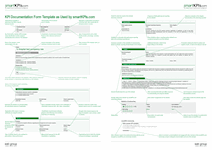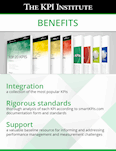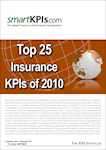Top 25 Insurance KPIs of 2010 E-Book
The KPI Institute
Summary
Overview
- Category: Research reports
- Product ID: sK0118042
- Publication date: November 1, 2011
- File format: PDF
- Download size: 3.85 MB
- Pages: 72
Insurance is one of those industries that, gradually, has become one of the largest and fastest growing in the world, responding to a basic human need: protection against financial losses resulting from a variety of hazards.
The Top 25 Insurance KPIs of 2010 report is a comprehensive analysis on the most popular KPIs for Insurance in 2010, selected by the number of views they received from the smartKPIs community in 2010.
About the Insurance industry
Insurance companies provide life insurance and reinsurance, with or without a substantial saving element and other non-life insurance (car, house, pension, etc.), underwriting annurities and disability income insurance, accidental death and dismemberment insurance policies.
Highlights from the report
Top 25 Insurance KPIs of 2010 offers an overview of the most popular KPIs in Insurance by combining input from the smartKPIs community with research and analysis from the editorial team. Some of the main sections are:
- “KPIs … Naturally”, an article that sets the context through a discussion on what is old and what is new in the use of KPIs;
- An introduction to the custom KPI documentation form developed by the smartKPIs research team for documenting KPIs(with over 30 fields of data, making this the most thorough KPI documentation template in use today);
- A list with the names of the Top 25 Insurance KPI examples in 2010 on smartKPIs, followed by a brief analysis of each;
- Among the most popular 25 KPI examples for the Insurance industry in 2010, top 3 is made of:
- # Insurance claim processing time
- % Policy renewal rate
- # Insurance underwriting time
- A detailed description of each KPI listed in the report, as documented in smartKPIs Premium (the premium content section of smartKPIs);
- Comprehensive insights on Key Performance Indicators (KPIs) as performance measurement tools and a glossary explaining the most popular terms characterizing KPIs.
Course media
Description
Table of contents
- Executive Summary
- About Key Performance Indicators (KPIs)
- KPIs ... Naturally
- smartKPIs Community Profile
- 2010 smartKPIs Functional Areas Taxonomy
- 2010 smartKPIs Industries Taxonomy
- KPI Documentation form Explained
- Insurance as an industry
- Top 25 Insurance KPIs of 2010 List
- Top 25 Insurance KPIs of 2010 Countdown Analysis
- Appendix A: Glossary of Terms
- Appendix B: Related Reports
- Appendix C: About eab group
- Appendix D: eab group Services
- Appendix E: eab group Online Portfolio
Questions and answers
Currently there are no Q&As for this course. Be the first to ask a question.
Reviews
Currently there are no reviews for this course. Be the first to leave a review.
Legal information
This course is advertised on reed.co.uk by the Course Provider, whose terms and conditions apply. Purchases are made directly from the Course Provider, and as such, content and materials are supplied by the Course Provider directly. Reed is acting as agent and not reseller in relation to this course. Reed's only responsibility is to facilitate your payment for the course. It is your responsibility to review and agree to the Course Provider's terms and conditions and satisfy yourself as to the suitability of the course you intend to purchase. Reed will not have any responsibility for the content of the course and/or associated materials.




